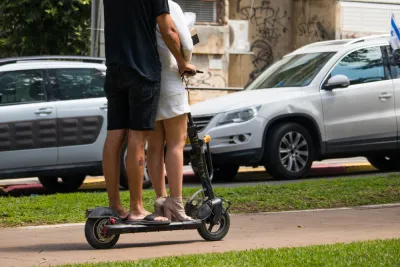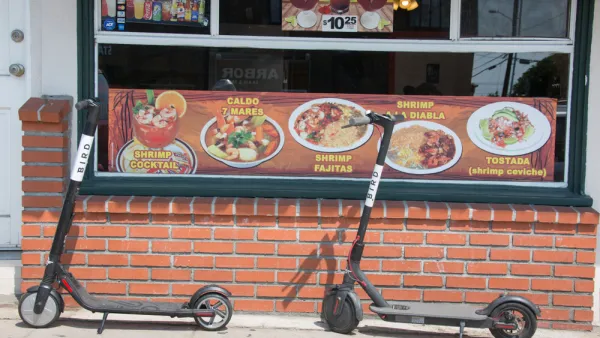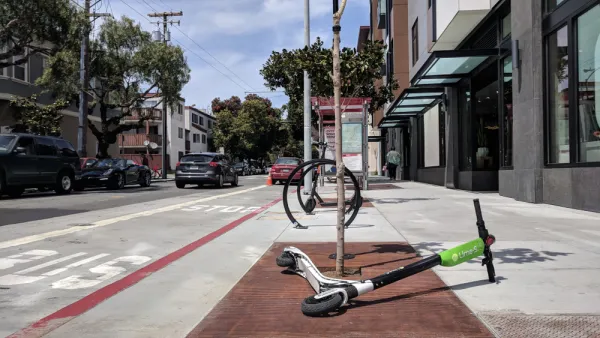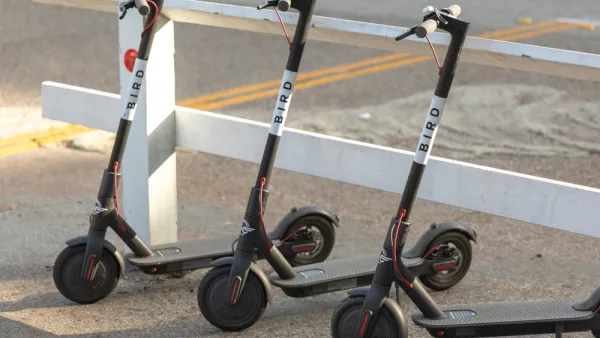Tony Dutzik, senior policy analyst with the Frontier Group, presents three environmental reasons to support shared bikes and scooters, and why cities that have adopted climate plans should accommodate these small, clean, shared vehicles.

"In my home city of Boston, you can now find an increasingly madcap array of small vehicles on the streets and sidewalks – regular bikes, e-bikes, electric scooters, hoverboards, manual and electric skateboards of various kinds," writes Dutzik in a blog post for the Frontier Group. "There are even electric unicycles."
At the same time, app-based shared mobility is making some of these new types of vehicles available to anyone with a couple of bucks and a couple of minutes to download an app. The dockless bikeshare and scooter-share revolution has come quickly – often causing controversy along the way.
All these electric (and human-powered) vehicles and devices "have radical implications for our cities, and for our efforts to curb transportation’s contribution to global warming," he writes. "The environmental case for shared electric vehicles rests on three ideas."
- First, that electric vehicles are vastly more energy efficient than internal combustion engine vehicles and can run on clean energy.
- Second, that sharing vehicles eliminates the inherent incentive to drive that comes with having a vehicle sitting in your driveway that you are already paying for.
- The third – and probably least frequently discussed – idea is that internal combustion engines and individual ownership force a design logic on our vehicles that limits our opportunities to make them more efficient.
In a lengthy April interview with The New York Times in Venice, Los Angeles, where Bird has built its new headquarters, founder and CEO Travis VanderZanden makes the equity case for sharing these vehicles.
“Not everyone can afford their own electric scooter,” he said. “We shouldn’t discriminate against people that are renting versus owning.”
His point is a valid one. In the days since the Birds, as well as the Lime and Spin scooters have disappeared from the streets of San Francisco, one can still spot occasional electric scooters in the bike lanes, but without the names of the scooter-share companies.
Last words go to Dutzik:
A future in which small-scale electric and manually-powered mobility can work its transformative magic is one in which our cities must make a bold commitment to reallocating space on our streets – giving small, slow, light vehicles at least as much priority as big, heavy ones – and renegotiating the rules of how we all get around.
FULL STORY: Scoot Over, Cars: Making Space for Small Vehicles

National Parks Layoffs Will Cause Communities to Lose Billions
Thousands of essential park workers were laid off this week, just before the busy spring break season.

Retro-silient?: America’s First “Eco-burb,” The Woodlands Turns 50
A master-planned community north of Houston offers lessons on green infrastructure and resilient design, but falls short of its founder’s lofty affordability and walkability goals.

Delivering for America Plan Will Downgrade Mail Service in at Least 49.5 Percent of Zip Codes
Republican and Democrat lawmakers criticize the plan for its disproportionate negative impact on rural communities.

Test News Post 1
This is a summary

Test News Headline 46
Test for the image on the front page.

Balancing Bombs and Butterflies: How the National Guard Protects a Rare Species
The National Guard at Fort Indiantown Gap uses GIS technology and land management strategies to balance military training with conservation efforts, ensuring the survival of the rare eastern regal fritillary butterfly.
Urban Design for Planners 1: Software Tools
This six-course series explores essential urban design concepts using open source software and equips planners with the tools they need to participate fully in the urban design process.
Planning for Universal Design
Learn the tools for implementing Universal Design in planning regulations.
EMC Planning Group, Inc.
Planetizen
Planetizen
Mpact (formerly Rail~Volution)
Great Falls Development Authority, Inc.
HUDs Office of Policy Development and Research
NYU Wagner Graduate School of Public Service





























